Crafting a Social Work Cover Letter (No Experience)
Securing your first social work position without prior experience can feel challenging, but a well-crafted cover letter is your most powerful tool. This guide will help you navigate the process, showcasing your potential and passion for social work, even when you lack direct experience. By focusing on transferable skills, education, and relevant experiences, you can create a compelling cover letter that grabs the attention of hiring managers and sets you apart from other applicants. It’s about demonstrating your understanding of the field, your commitment to helping others, and your eagerness to learn and grow.
Understanding the Purpose and Importance
Why a Cover Letter Matters
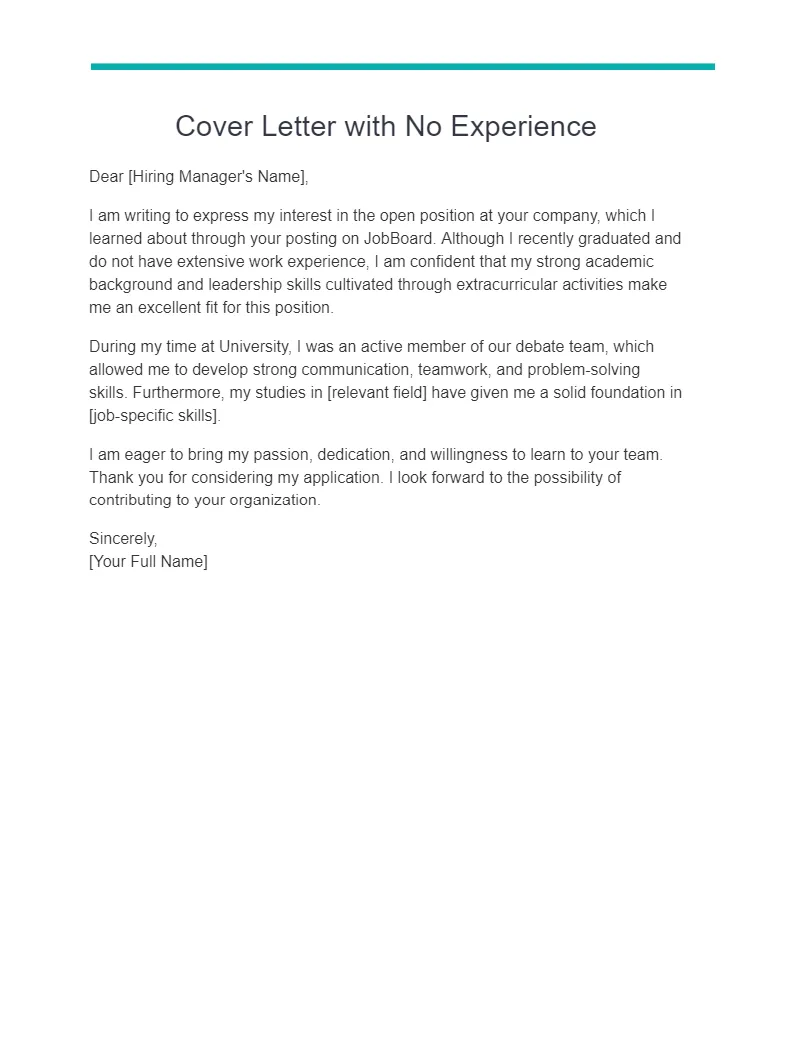
A cover letter isn’t just a formality; it’s your opportunity to tell your story. It provides context to your resume, allowing you to elaborate on your skills, motivations, and career goals. For those with limited experience, it’s even more crucial. It enables you to connect your education, volunteer work, and other experiences to the specific requirements of the job. It showcases your personality, your communication skills, and your genuine interest in the organization. It gives the hiring manager a glimpse into who you are beyond the list of qualifications on your resume, offering a human connection that can significantly increase your chances of being interviewed.
Highlighting Transferable Skills
Even without direct social work experience, you possess transferable skills that are highly valued in the field. These are skills you’ve developed in other contexts – academic, volunteer, or personal – that are relevant to social work. Examples include communication, empathy, problem-solving, organization, and critical thinking. Identifying and highlighting these skills is crucial. Instead of focusing on what you haven’t done, emphasize what you can do. For example, if you’ve volunteered at a crisis hotline, discuss how you used active listening skills to de-escalate situations. If you excelled in group projects at university, highlight your ability to collaborate and work effectively as part of a team. By framing your experiences in terms of these transferable skills, you demonstrate your readiness for the role.
Addressing the Lack of Direct Experience
It’s important to acknowledge the lack of direct experience without letting it become a negative focus. Be upfront, but don’t dwell on it. Instead, quickly transition to what you do have to offer. Frame your lack of experience as an opportunity for growth and a demonstration of your eagerness to learn. Show the hiring manager that you understand the responsibilities of the role and that you are committed to developing the necessary skills through training and professional development. Highlight any coursework, internships, or volunteer work that has provided you with relevant knowledge or exposure to the social work field.
Emphasizing Education and Qualifications
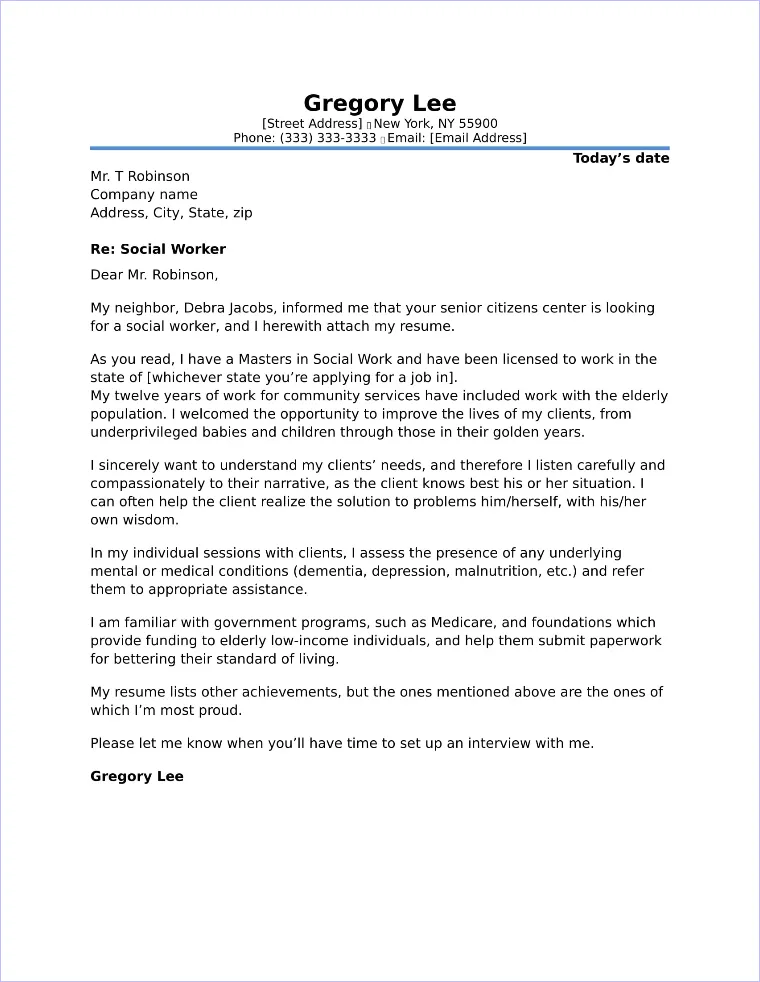
Your education is a significant asset. Highlight your degree (e.g., Bachelor of Social Work, Master of Social Work), any relevant coursework (e.g., social policy, human behavior), and your GPA if it’s impressive. Mention any academic achievements, honors, or specializations. If you’re a recent graduate, emphasize the knowledge and skills you gained through your program, such as assessment techniques, intervention strategies, and ethical considerations. Demonstrate that you have a strong theoretical foundation in social work principles and that you are ready to apply this knowledge in a practical setting. For example, discuss specific projects or research papers that align with the job requirements.
Showcasing Relevant Volunteer Work or Internships
Volunteer work and internships are invaluable, as they offer hands-on experience and a chance to apply your skills. Describe your responsibilities, the populations you worked with, and the specific skills you utilized. Quantify your accomplishments whenever possible. For example, instead of saying “Assisted clients,” say “Provided support to 20+ clients weekly.” If you worked with a specific population (e.g., homeless individuals, children with disabilities), mention it, as this demonstrates your familiarity with diverse needs. Highlight any challenges you faced and how you overcame them, showing your resilience and adaptability. Emphasize the impact you made, even if it was small, and how these experiences have shaped your passion for social work.
Structuring Your Social Work Cover Letter
A well-structured cover letter makes a positive impression. It demonstrates your attention to detail and organizational skills. Use a clear, professional format that is easy to read. This includes appropriate spacing, clear headings, and concise paragraphs. Your cover letter should complement your resume, providing additional context and showcasing your unique qualifications. Remember to proofread your cover letter carefully to eliminate any grammatical errors or typos. A polished and error-free letter reflects professionalism and respect for the opportunity. Use a standard business letter format, ensuring your letter is clear, concise, and easy to navigate.
Header and Contact Information
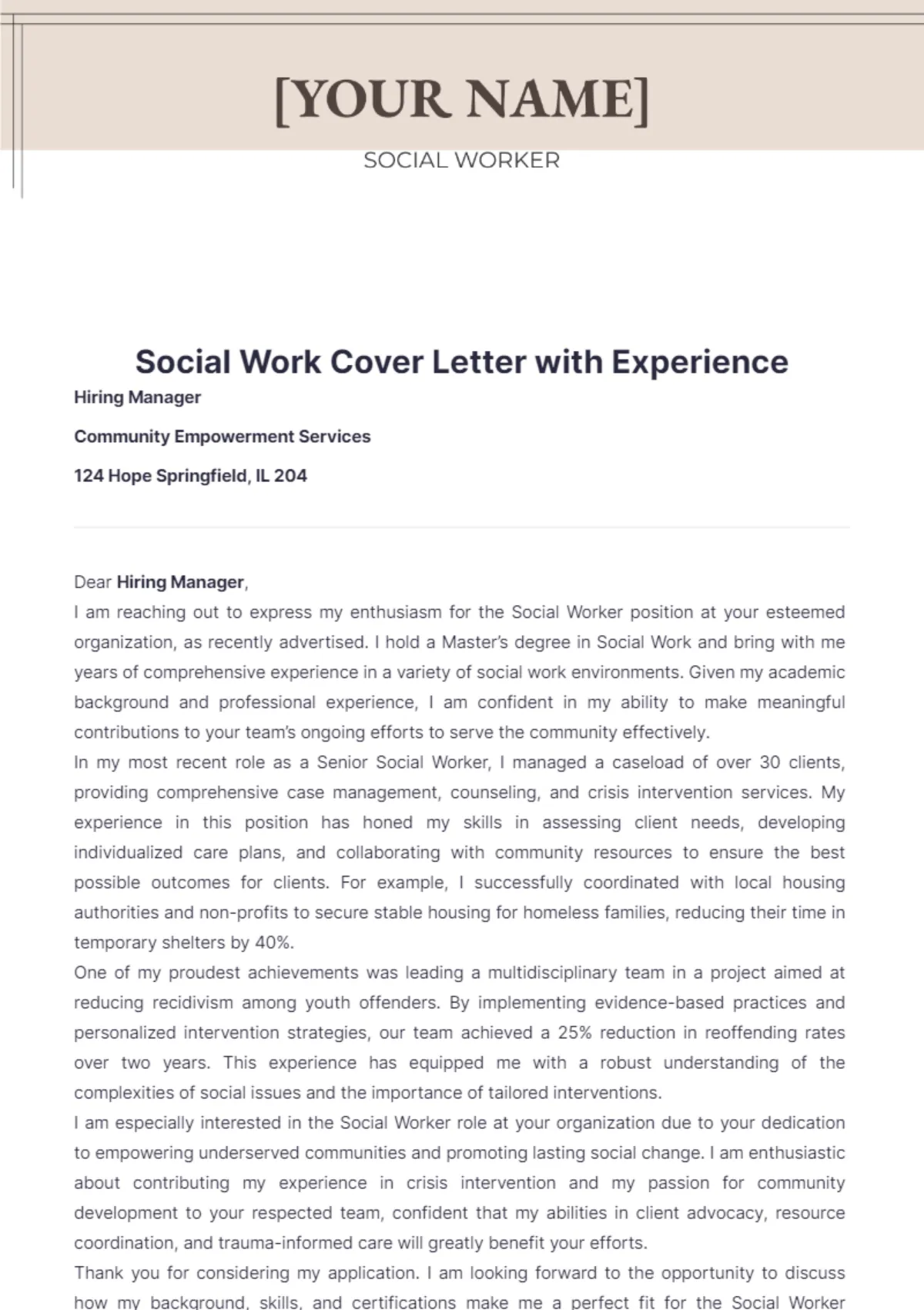
Start with your full name, address, phone number, and email address. Include the date and the hiring manager’s name and title (if known), along with the organization’s address. This is the first information the hiring manager will see, so it should be accurate and professional. If you can’t find the hiring manager’s name, use a generic salutation like ‘Dear Hiring Manager’ or ‘Dear [Department Name] Team’.
Opening Paragraph
The opening paragraph is your first chance to grab the reader’s attention. State the position you are applying for and where you saw the job posting. Briefly express your enthusiasm for the role and the organization. Highlight one or two key skills or qualifications that make you a strong fit, even without direct experience. Make it clear why you’re interested in this particular opportunity and what motivates you to pursue a career in social work. Convey your understanding of the organization’s mission or values and how you can contribute to their success.
Body Paragraphs Highlighting Skills and Passion
Use the body paragraphs to showcase your skills, qualifications, and experiences. Focus on the job description’s requirements and tailor your letter accordingly. Provide specific examples of how your skills match the job’s needs. This is where you highlight your transferable skills and explain how your education, volunteer work, or internships have prepared you for the role. Connect your experiences to the social work principles of empathy, advocacy, and social justice. Illustrate your understanding of ethical considerations and professional boundaries. Keep your paragraphs concise, focused, and engaging, ensuring each point is relevant to the position.
Closing Paragraph and Call to Action
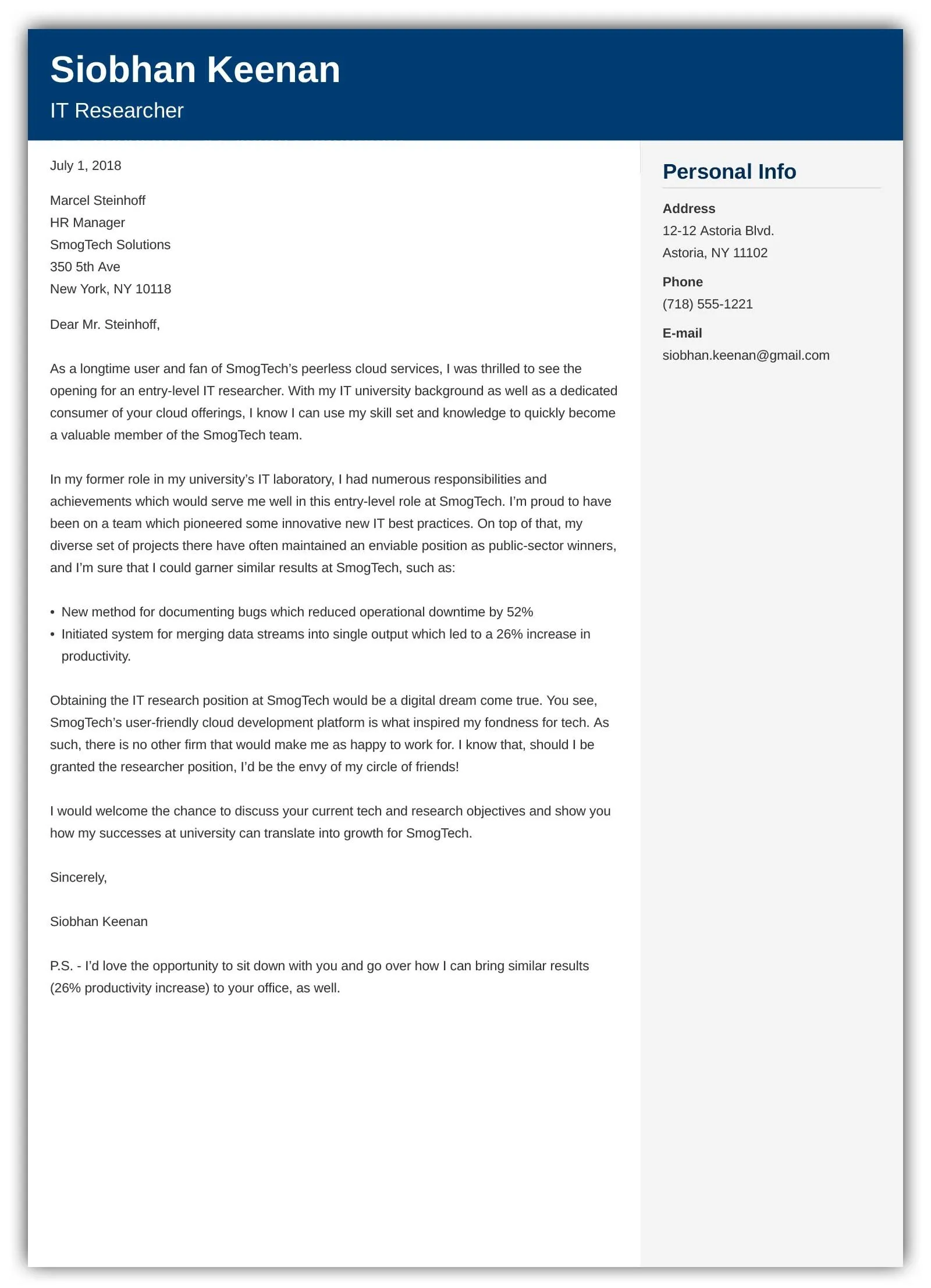
In your closing paragraph, reiterate your interest in the position and the organization. Thank the hiring manager for their time and consideration. Express your availability for an interview and include a clear call to action, such as ‘I look forward to hearing from you soon’ or ‘Thank you for considering my application; I am available for an interview at your earliest convenience.’ Reiterate your enthusiasm and your desire to contribute to the team. Proofread the entire letter one last time to ensure it is free of errors and reflects your professionalism.
Key Skills to Include in Your Cover Letter
Identify the essential skills required for the social work position you’re applying for and include them in your cover letter. These skills demonstrate your readiness for the role and are essential for success in the field. Tailor your skill set to match the specific job description. For example, if the job requires crisis intervention skills, emphasize your experience in de-escalation techniques. Use keywords from the job posting and weave them naturally into your letter, showing that you’ve carefully considered the requirements. Back up each skill with concrete examples from your experiences, providing evidence of your abilities.
Communication and Interpersonal Skills
Communication is critical in social work. Highlight your ability to communicate effectively both verbally and in writing. Give examples of how you have explained complex information clearly and concisely. Emphasize your active listening skills and ability to build rapport with diverse populations. Interpersonal skills include empathy, compassion, and the ability to build strong relationships with clients and colleagues. Demonstrate your ability to be patient, understanding, and supportive. Mention any experience you have working with diverse populations and adapting your communication style to meet their needs.
Empathy and Compassion
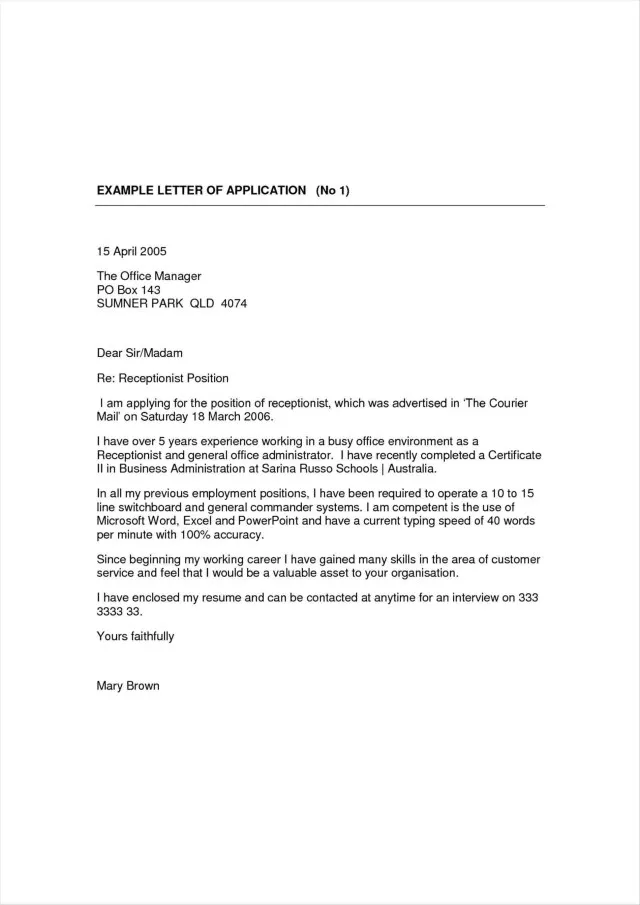
Empathy and compassion are at the heart of social work. Show how you understand and share the feelings of others. Provide examples of times when you have demonstrated empathy and supported individuals facing difficult circumstances. Describe how you maintained compassion while upholding professional boundaries. Highlight any volunteer work or personal experiences that have enhanced your ability to understand and connect with people from different backgrounds and with varying needs. Explain how you actively listen to clients and show your commitment to their well-being and dignity.
Problem-Solving and Critical Thinking
Social workers must be skilled problem-solvers and critical thinkers. Highlight your ability to assess situations, identify needs, and develop effective solutions. Give examples of how you have analyzed information, considered different perspectives, and made informed decisions. Demonstrate your ability to think creatively and adapt to changing circumstances. Show how you have used critical thinking skills to evaluate programs, policies, or interventions. Mention any training or experience in using assessment tools or evidence-based practices.
Tailoring Your Cover Letter for Specific Jobs
Customize your cover letter for each job application. This will significantly increase your chances of success. Review the job description carefully and identify the key requirements and skills. Research the organization to understand its mission, values, and culture. Use the job description’s keywords throughout your letter, demonstrating that you have the skills and experience the employer seeks. Provide specific examples from your experiences that align with the requirements. Ensure your letter highlights the qualities that make you a good fit for the organization. Do not submit a generic letter. Every cover letter should be tailored to the specific role and the organization’s unique needs.
Researching the Organization
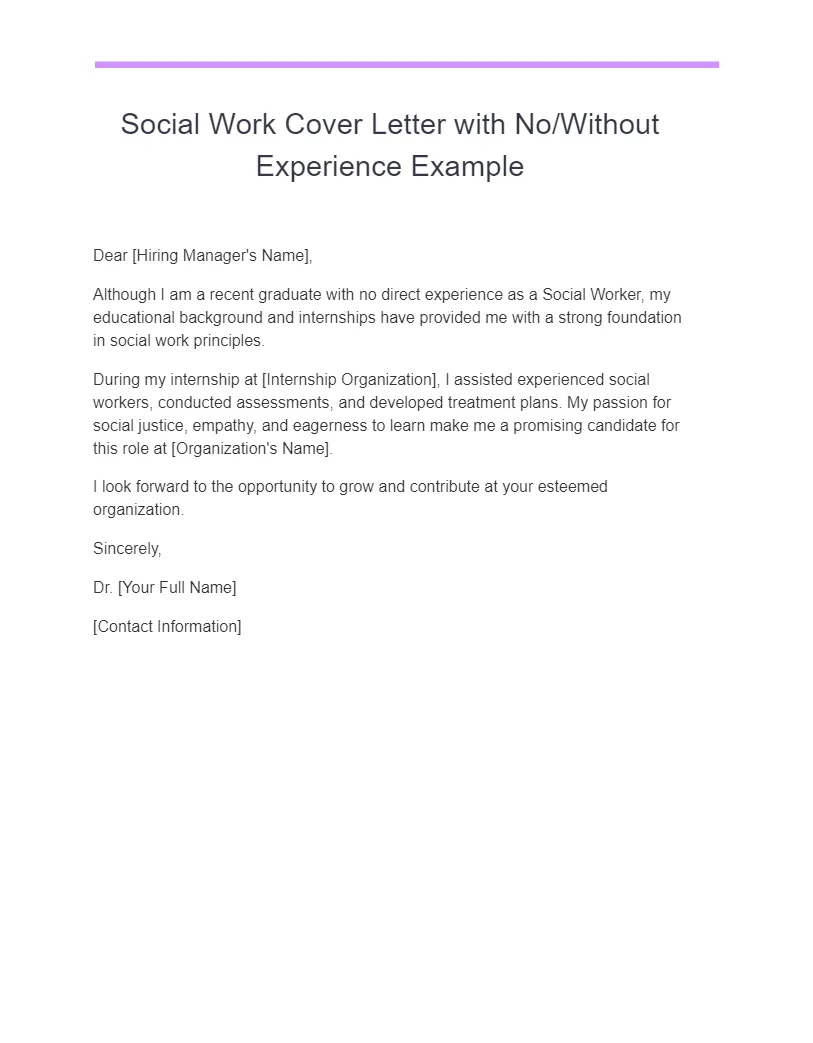
Thoroughly research the organization before writing your cover letter. Understand their mission, values, services, and target populations. Visit their website, read their annual reports, and explore their social media presence. This will help you tailor your letter and demonstrate your genuine interest. Identify the organization’s goals and how your skills and experiences align with their objectives. Mention specific programs, initiatives, or values that resonate with you. Show that you understand the organization’s work and how you can contribute to its success. Your research will also provide valuable context for your cover letter.
Matching Skills to Job Requirements
Carefully review the job description and identify the key skills, qualifications, and experiences that the employer is seeking. Then, demonstrate how your skills and experiences align with these requirements. Use specific examples from your education, volunteer work, or other experiences. If the job requires experience with a specific population, highlight any relevant experience you have. If the job emphasizes crisis intervention, discuss relevant training or experience. Use the same keywords from the job description in your cover letter, showing the hiring manager that you understand the role’s needs. Tailoring your skills to the job requirements demonstrates your adaptability and your keen understanding of the position.
Example Cover Letter Snippets
To help you get started, here are some example snippets you can adapt for your cover letter. Remember to tailor these examples to your specific experiences and the job description. Use these as a template, not a script. The key is to showcase your unique skills and passion for social work. Use active language and action verbs. Quantify your achievements whenever possible, and always proofread your letter before sending it.
Sample Opening Paragraph
Dear [Hiring Manager name], I am writing to express my enthusiastic interest in the Social Worker position at [Organization Name], as advertised on [Platform]. Although my experience in the field is developing, my passion for social justice, coupled with my [Degree] in Social Work from [University Name], has equipped me with a strong foundation in [mention key skills] making me eager to contribute to your team. I am particularly drawn to [Organization Name]’s commitment to [Organization’s Mission/Value], which aligns perfectly with my career aspirations.
Sample Body Paragraph (Skills)
During my volunteer work at [Organization Name], I gained extensive experience in providing support to individuals experiencing [issue], where I developed my active listening skills to understand the challenges they are facing and connecting them with suitable resources. I also developed strong skills in conflict resolution, using de-escalation techniques to mediate tense situations and ensure a safe environment. This experience has reinforced my commitment to empathetic practice and advocating for the vulnerable.
Sample Closing Paragraph
Thank you for considering my application. I am excited about the opportunity to contribute my skills and passion to [Organization Name]. I am available for an interview at your earliest convenience and can be reached at [phone number] or [email address]. I look forward to hearing from you soon and discussing how I can contribute to your team.
